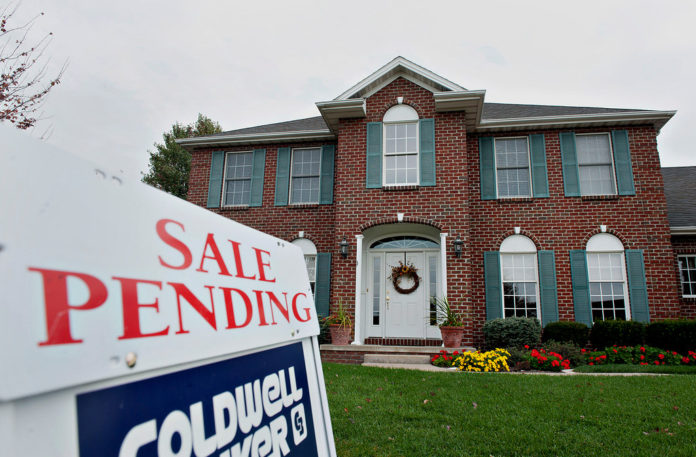
WASHINGTON – Purchases of new U.S. homes unexpectedly decreased in December, a temporary blemish as the industry wrapped up its best year since 2009 to emerge as a bright spot for the economy.
The 7.3 percent drop in December sales to a 369,000 annual pace followed the prior month’s 398,000 rate that was faster than previously estimated, Commerce Department figures showed today in Washington. Builders sold 367,000 homes in 2012, the most in three years and the first annual increase in seven.
Mortgage rates near record lows, improved job prospects and a rising number of households should keep stoking demand and benefit builders such as Lennar Corp. and KB Home. Combined sales of new and previously owned properties last year rose 9.9 percent, the biggest annual gain since 1998 and an indication residential real estate is helping drive growth.
“2013 will show more of an increase in prices and more positive sales activity and housing starts,” said Anika Khan, a senior economist at Wells Fargo Securities LLC in Charlotte, North Carolina, a unit of the biggest U.S. mortgage lender. “We expect to see residential investment adding to growth despite a very sluggish overall pace of economic growth.”
Stocks rose, sending the Standard & Poor’s 500 Index to its first eight-day rally since 2004, as companies posted better- than-estimated earnings. The S&P 500 climbed 0.3 percent to 1,498.94 at 11:51 a.m. in New York.
The strength in housing is helping extend the U.S. economic expansion even as the global economy struggles.
Britain’s economy
Britain’s economy shrank more than forecast in the fourth quarter as the boost from the Olympic Games unwound and oil and gas output plunged, leaving the country on the brink of an unprecedented triple-dip recession. Gross domestic product dropped 0.3 percent from the three months through September, when it grew 0.9 percent, the Office for National Statistics said today in London.
In Japan, consumer prices fell in December for the seventh time in eight months, underscoring the risk that the central bank may struggle to reach a 2 percent inflation target unless it implements new easing measures earlier than planned.
The median estimate of 77 economists surveyed by Bloomberg called for a 385,000 pace on U.S. new-home sales in December. Forecasts ranged from 340,000 to 406,000 at an annual rate after a previously reported 377,000 in November.
2012 sales
For all of 2012, new-home sales increased 19.9 percent, the biggest jump since 1983 and the first gain since 2005.
At Lennar, the largest U.S. homebuilder by market value, revenue jumped 42 percent in the three months ended Nov. 30 from a year earlier.
“2012 was a turnaround year that confirmed what we had been seeing and communicating for several quarters, and that is that we are in fact in the early stages of the housing recovery,” Stuart Miller, chief executive officer at Miami- based Lennar, said on a Jan. 15 earnings call. “The recovery began in micro markets across the country, and it’s continued to spread.”
Los Angeles-based builder KB Home said this week that orders for new dwellings climbed 54 percent in the first seven weeks of its fiscal first quarter.
Today’s Commerce Department data showed the median price of a new home in the U.S. increased 13.9 percent last month from a year ago, climbing to $248,900.
In December, purchases decreased in three of four regions, led by a 29.4 percent slump in the Northeast. Sales also fell 11.1 percent in the West and 8.4 percent in the South. They rose 21.3 percent in the Midwest.
The housing data for last year show the market gained vitality in 2012. Construction of new properties rose last month to the fastest pace since June 2008, according to Jan. 17 Commerce Department data. The December figure capped the best year for homebuilding since 2008.
Today’s report showed the supply of new homes at the current sales rate climbed to 4.9 months from 4.5 months in November. There were 151,000 new houses on the market at the end of December, up from 149,000 the prior month.
Some 1.82 million previously-owned homes were on the market in December, the fewest since January 2001, according to National Association of Realtors data earlier this week.
The building environment has brightened the mood among construction companies. The National Association of Home Builders/Wells Fargo builder sentiment index held at 47 in January, the highest since 2006. Nonetheless, readings below 50 mean more respondents said conditions were poor.
‘Fairly optimistic’
“We think that 2013 is going to be a good year for the U.S. construction industry,” Charles Bunch, chief executive officer of paint and glass maker PPG Industries Inc., said during a Jan. 14 earnings call. “You’re seeing a lot of anecdotal information about, in certain markets, the housing resale market strengthening. We’ve seen increases in new-home construction permits and starts, so, overall, I would say we’re fairly optimistic.”
Figures from the NAR earlier this week showed previously owned homes sold at a 4.94 million rate in December, the second- highest since 2009. Last year 4.65 million homes were sold, up 9.2 percent from 4.26 million in 2011 and the most since 2007. The annual advance was the biggest since 2004.
Sales of new homes, counted when contracts are signed, are considered a timelier barometer than purchases of previously owned dwellings, which are calculated when a deal closes. Newly constructed houses accounted for 7.3 percent of the residential market in 2012, down from a high of 15 percent during the boom of the past decade.












